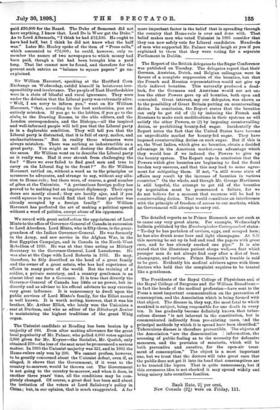The Unionist candidate at Reading has been beaten by a
majority of 694. Even after making allowance for the great local popularity of Mr. Palmer, who polled 4,600 votes against 3,906 given for Mr. Keyser—the Socialist, Mr. Quelcb, only obtained 270—the loss of the seat must be pronounced a serious matter. In 1895 the Unionist majority was 351, and in 1892 the Home-rulers only won by 200. We cannot profess, however, to be greatly concerned about the Unionist defeat, even if, as alleged, it shows that the Government, if it went to the country to-morrow, would be thrown out. The Government is not going to the country to-morrow, and when it does, in another three years' time, all the conditions may be com- pletely changed. Of course, a great deal has been said about the irritation of the voters at Lord Salisbury's policy in China; but, in our opinion, that is much exaggerated. A far more important factor is the belief that is spreading through the country that Home-rule is over and done with. That belief makes men who voted Unionist in 1895 consider that they can now safely vote for Liberal candidates. Hundreds of men who supported Mr. Palmer would laugh at you if you explained to them that they were voting for a separate Parliament in Dublin.


































 Previous page
Previous page